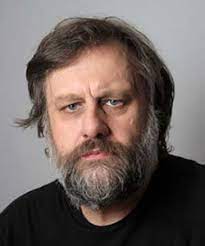Žižek, Slavoj

Bio: (1949-) Slovenian sociologist and philosopher. Slavoj Žižek holds a doctorate in philosophy from the University of Ljubljana and one in psychoanalysis from the University of Paris VIII and teaches at the universities of Ljubljana, New York, and London. In his scientific work, he synthesizes the psychoanalytic approach of Jacques Lacan, postmodernism, and Marxism. He is the author of a large number of books in which he studies classical philosophy, politics, ideology, fascism, totalitarianism, capitalism and consumer culture, popular culture (especially movies), and others.
In his book The Sublime Object of Ideology (1989), he compares the class struggle with Lacan's concept of the "real." Žižek singles out two mechanisms by which ideology unites the social into a harmonious and coherent totality. Ideology provides unconscious objects in order to nullify the internal contradictions that exist in society. He sees the problems that exist in society as symptoms. These objects serve as symbols that suppress internal social antagonisms. On the other hand, to shape a harmonious image of oneself, ideologies project social problems onto the outside world. Žižek believes that society manages to maintain its own illusion of integrity by creating an ideology, while ideology itself is a mere construct and fantasy. Ideology, as a social fantasy, falsely identifies the object as the culprit, instead of solving the symptom of the problem. In that sense, he cites the Nazi ideology that used the Jews as a scapegoat, and blame them for all social problems, that is, the symptoms of social antagonisms.
In the book Lenin 2017 (2017), Žižek calls for the renewal of Lenin's political vision, in order to start the fight against the hegemonic status quo that arose from the globalization of the capitalist economy. This escape from the status quo would be a "Lacanian act" that would enable the emergence of new political, cultural, and economic realities. Lenin's project thus becomes a problem for the hegemonic symbolic order and a problem that opens up possibilities for radical change.
Main works
Problemi teorije fetišizma, 2: Philosopherija skoz psihoanalizo (1985);
The Sublime Object of Ideology (1989);
Looking Awry: An Introduction to Jacques Lacan through Popular Culture (1991a);
For They Know Not What They Do: Enjoyment As A Political Factor (1991b);
Enjoy Your Symptom! Jacques Lacan In Hollywood and Out (1992);
Tarrying With The Negative: Kant, Hegel And The Critique Of Ideology (1993);
The Metastases Of Enjoyment (1994a);
Mapping Ideology (1994b);
The Abyss Of Freedom (1997a);
The Plague Of Fantasies (1997b);
The Ticklish Subject: The Absent Centre of Political Ontology (1999a);
The Fragile Absolute or Why the Christian Legacy is Worth Fighting For (2000a);
Contingency, Hegemony, Universality (2000c);
Did Somebody Say Totalitarianism? (2001a);
On Belief (2001b);
Welcome to the Desert of the Real (2002);
The Puppet and the Dwarf: The Perverse Core of Christianity (2003);
Organs Without Bodies: On Deleuze and Consequences (2004);
The Universal Exception (2005a);
The Parallax View (2006);
In Defense of Lost Causes (2008);
Living in the End Times (2010);
Less Than Nothing: Hegel and the Shadow of Dialectical Materialism (2012);
Refugees, Terror and Other Troubles with the Neighbours (2016);
Lenin 2017 (2017);
Pandemic!: COVID-19 Shakes the World (2020).

